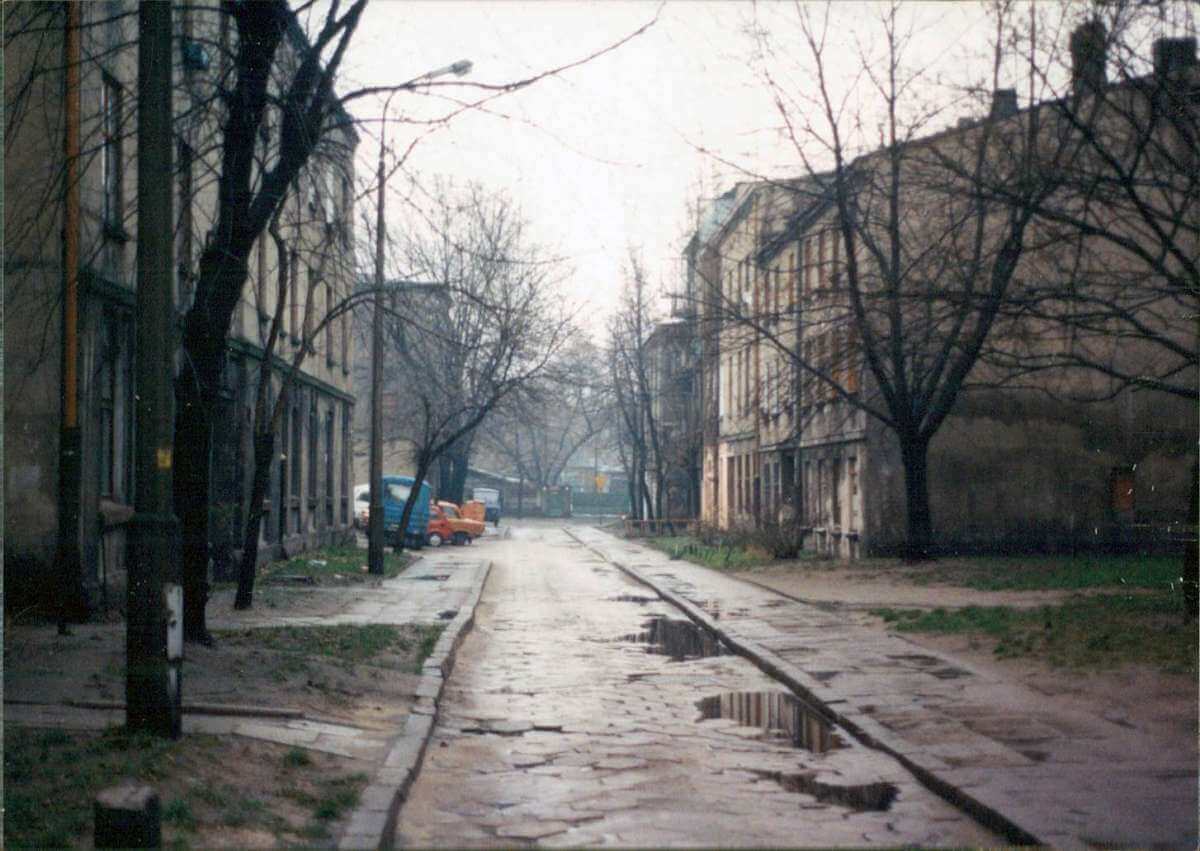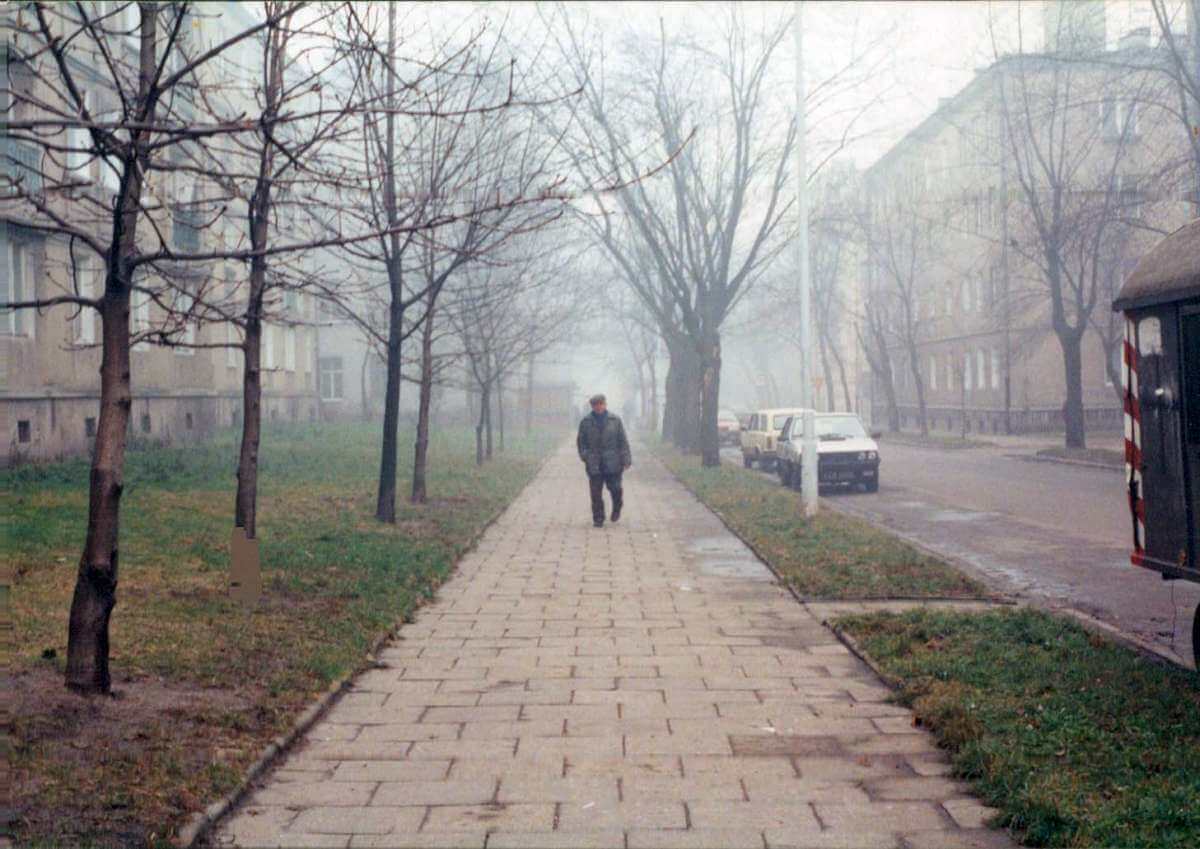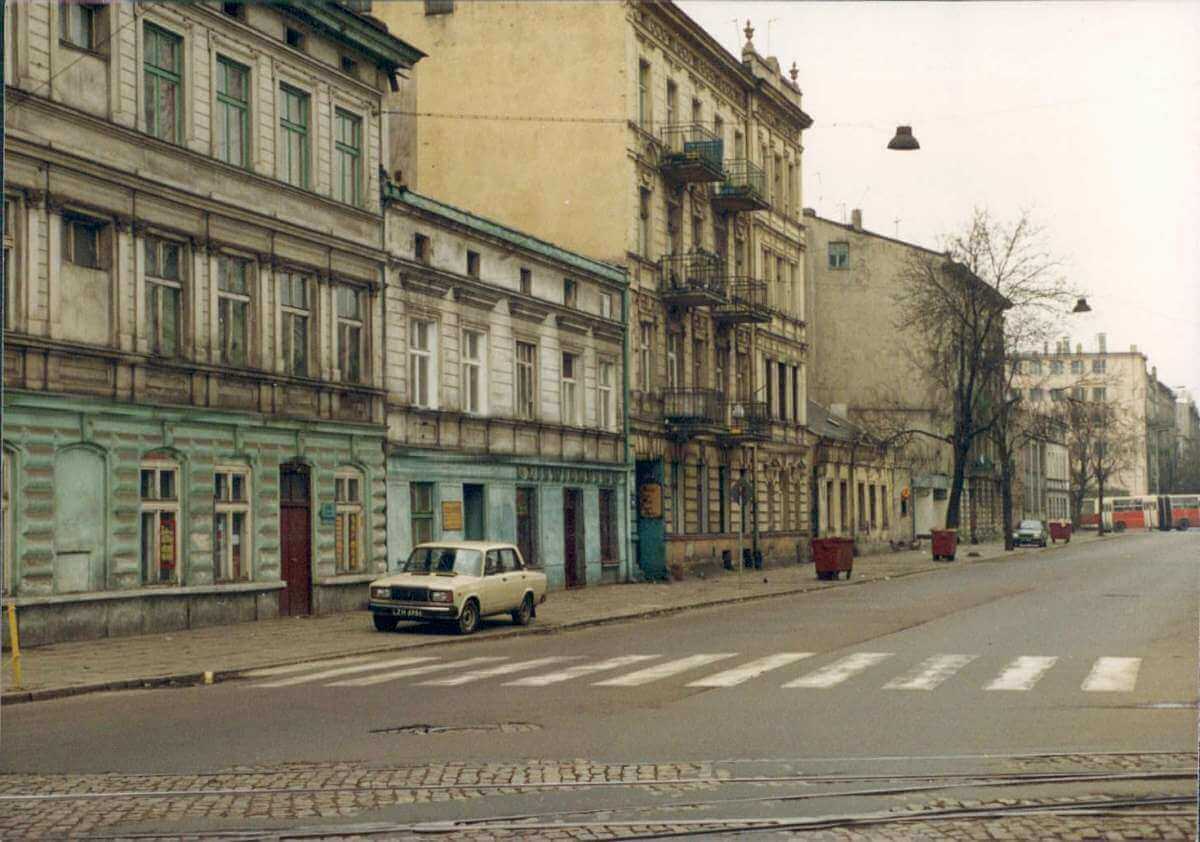Night driving in Poland is dangerous. East European headlights are about as bright as a forty-watt bulb. Polish country roads, especially in the south, snake around in woods and ravines, and Poles above the age of fifteen dress in dark colors: blue denim and black leather for the teens and twenties, gray and dark blue cotton or polyester on the oldies. It often rains, and sometimes there is fog. In cities people step without warning into zebra-striped crosswalks from which the paint has virtually disappeared; in the country they drive bicycles without headlights, tractors without reflecting triangles. In both city and country drunken men stumble along the road at all hours. Trabants, Ladas, Syrenas, and old Polski Fiats, many without tail or brake lights, putter along at thirty kilometers per hour. I will be pressing ahead through a driving rain, straining to see through the oily grime of diesel fumes and sandy road grit deposited on my windshield by trucks lacking mudflaps, and out of nowhere a dark figure on a battered bicycle will loom up twenty feet ahead, a gray apparition on one of those heavy Soviet one-speeds, weaving toward the highway, then back to the shoulder, then onto the road, oblivious to my lights or horn, and I will swerve quickly left and back again, and almost before I notice it, the figure will have receded forever into the Polish dark.
Trabants, Ladas, Syrenas, and old Polski Fiats, many without tail or brake lights, putter along at thirty kilometers per hour.
Or I will come with equally short warning on a tractor hauling a wooden wagon, a cow or pig riding along or a load of turnips, or maybe a horse-drawn cart filled with potatoes or black coal, taking its own sweet time and the whole width of my lane, and then a sudden braking, and down-shifting, a quick check for passing room, and the apparition is gone again into the dusk. Sometimes the specter is a hitch-hiking soldier (always I am long past before I have decided to pick him up; always I feel regret and guilt), sometimes a pair of workers on their way to the job (Poles are very early risers) or young girls dressed to the nines on their way home from a party (Poles party late). To drive at night in Poland is to transverse a foggy landscape out of which rise and into which vanish a series of figures from the void, archetypes from the great Collective Subconscious.
Night driving is a good metaphor for life in Poland in general, for even in the New Poland the fog machine is usually on.
The fog machine is usually on.
If you have read Ken Kesey’s One Flew Over the Cuckoo’s Nest, you will remember the Fog Machine:
Right now they have the fog machine switched on, and it is rolling in so fast I can’t see a thing but her face, rolling in thicker and thicker, and I feel as hopeless and dead as I felt happy a minute ago… And the more I think about how nothing can be helped, the faster the fog rolls in.
And I’m glad when it gets thick enough you’re lost in it, and can let go, and be safe again.
“She” was Nurse Ratched, and the hospital ward jelled to slow-mo was Chief Bromden’s image for what The Combine had done to modern America, one of the novel’s central metaphors and one lamentably lost in Cuckoo’s Nest—The Movie. At the I.F.A. I frequently use the fog machine as a metaphor for life in Old Poland. Colleagues and students familiar with Kesey seem to appreciate what I am trying to say.
The fog machine is on in New Poland as well, even after the demise of the secret police, party observers, and all the market shortages that might at one time have legitimatized obfuscation. People are never really sure what’s happening, what’s supposed to happen, or—by extension—what really did happen. The psychological landscape is nearly as melted as the physical landscape. Or perhaps they know, but they are not telling. Who’s giving the American literature exam? What requirements govern a master’s thesis? When and where do classes meet? Is attendance required? Are both May 1 and May 3 (Polish Constitution Day) official holidays? What about Wednesday, May 2? What about Monday, April 30, and Friday, May 4?
Yes.
No.
Maybe.
We don’t know.
Now that he’s elected, just how long will Poland’s new president serve? Well, the term has yet to be decided. When might general elections be held? The date is not set. What rules control foreign investment in Poland? They are subject to change. How will privatization work? The process has yet to be worked out. When you do get an answer, it is as likely to be wrong as right—like talking to three different people at I.R.S. Pick the response that pleases you. (My predecessor in Łódź inquired three different times, of three different clerks, on the price of an airplane ticket to Egypt, each time receiving a different answer. The first price was attractive enough to make him book the flight; when he returned with his money, the price had doubled or tripled. He walked out of the office, returned a day later at a different time, and bought his seat for less than he had been quoted the first day).
Talking to three different people at I.R.S. Pick the response that pleases you.
Usually people avoid giving precise dates, exact translations, and direct answers to even the simplest question.
“What does the sign up there say?”
“Something about an award.”
Frequently people simply don’t know: when Piotr Salski was elected alderman in one of the small towns near Łódź, I congratulated his son Łukasz and asked, “What does a town alderman do in Poland?”
His response was, “We are not sure. I suppose his first job will be to discover what his job is.”
An especially foggy matter was my 1989-90 visa, on the surface a perfectly good 180-day, multiple-entry visa but, as events revealed, another one of those Polish deals. Just before leaving the country for a mid-term vacation, I noticed that, depending on the meaning of certain dates written on the passports themselves, our 180-day visa could expire with Michelle and me out of the country. I asked a colleague what to me seemed a simple question: “Does this visa expire 180 days after being issued, or 180 days after I entered the country?”
Examining the passport, she noticed the date 09. 08. 1989 written in pen on the visa. “What’s this all about?”
“That’s one thing I hoped you could tell me,” I answered. “It might be September 8, the day Michelle and I entered Poland. That date is stamped on this other page, a stamp we got when we arrived in Warsaw. Or it could be August 9, which could well be the date the visa was issued back in Washington. Do Poles write the month or the day first?”
“Well I’m not sure. It was one way, and then it changed. I can’t tell what date this is.”
“If the date there is August 9, this visa will expire while I am in Germany. If the date is September 8, when I entered the country, we’re okay.”
“Tak, tak. I see.”
“Does the visa expire 180 days after being issued, or 180 days after I enter Poland?”
“Well this is hard to say. I will ask Iwona, our department secretary. She knows about such things.”
We asked Iwona, and Iwona agreed: “It must be 180 days from when you enter the country. Some Poles receive 30-day visas to other countries and do not even leave until 30 days after the visa is issued. I am sure that is what it would be.”
“What does the document itself say?”
“It says simply ‘for a period of 180 days.’ It is ambiguous.”
We phoned the central bureau in Łódź. The secretary there was also unsure how to interpret the date 09. 08. 1989, but she agreed with Iwona that my visa would expire 180 days after I first entered Poland.
Finally my director drew me to one side. “David, this is Poland. Do not worry about this thing. If you cannot get back before the term begins, that is our problem, not yours.”
I shrugged my shoulders: another one of those “Polish deals.”
“Polish deals.”
The rest of the story you can easily guess: on the Berlin-Warsaw train, at the Polish border, at approximately 1:30 a.m. on February 22, 1990, classes to begin in three days, Michelle and I handed our passports, fresh currency declarations, and new application for visa, copies B and C to the immigration officer. He stared at them for a couple of moments, frowned, and looked at us sternly. “Problem,” he said.
More outraged than enraged, I exploded. “This visa runs through March 8, 180 days after September 8. Look at the stamp over here. Officials in Łódź said everything is fine. Here are more papers, my health insurance, my university appointment, my monthly bus pass, my Legitymacja…”
A small crowd gathered in the corridor, and the word Amerykanin echoed up and down the length of the train car. The officer left, with passports, to collect his colleague officers. Together they studied the matter over.
Our papers were impressive, but these visas had definitely expired.
Well, our papers were impressive, but these visas had definitely expired, but apparently Łódź needed us, and since we did have some dollars handy, as a special favor, just this once, the immigration officer in charge was going to issue two-day, single-entry visas that would get us to Łódź, where we could apply for proper 180-day, multiple-entry visas. This was being very kind, he gave us to understand, since no entry visas to Poland are ever, under any circumstances, issued at the border. Then he took our $10 and filled a whole page of each passport with his two-day, early morning special. The crowd dissipated, and the train, behind schedule as always, ground eastward.

“Anybody who comes to Poland expecting to do business as usual is in for some surprises,” an official of the Marriott Inn once warned in print. Results of the periodic government-sponsored International Business Forums suggest that Western businessmen understand his warning: always there is tremendous Western interest in Polish opportunities, and always equally tremendous Polish interest in joint ventures. For three days the Marriott is a beehive of activity. But very few finalized or even pending agreements come out of these forums. Westerners are too wary of the fog.
In some ways the Polish fog surprised me: one Polish stereotype I grew up on was the super engineer, the mathematical genius, the guy who got 100+ on his physics exam, resolved quadratic equations without paper or sliderule, was certainly headed for megabucks as a systems analyst. Copernicus was a Pole. Scan the masthead of any computer magazine and tally up the Polish names. But the Poles I met seemed so completely and contentedly muddled: how to resolve this contradiction? Now friends in computers and physics tell me that mathematics is not all black-and-white, that there’s room for slip and slide, the computer is a mysterious as a Blake poem. Maybe I had it wrong. Maybe the Polish ability to navigate foggy landscapes is entirely compatible with the national genius in science and math. I don’t know. I was just surprised.
Westerners are too wary of the fog.
“No never means no,” we were told when we arrived in Poland, the Old Poland, or at least a Poland in transition. By extension, yes never means yes. Job descriptions, election dates, the price of an airplane ticket, who is in and out of jail and for what reasons, who is being detained and watched or questioned—these matters had been negotiable so long as to make obscurity a norm. Westerners face a double difficulty in Poland. The first is not insurmountable: adjusting to a world in which everything is ambiguous, nothing fixed, enshrouded in real or pretended ignorance. That adjustment can be made, although each detour in the fog provokes new rage. Gradually one learns the first lesson of Poland: “Spoko, spoko. Easy, easy.” You get there when you get there. If you get there.
Having made that adjustment, however, the Westerner perceives that he too is being bargained with, that perhaps he is only being bargained with, that friendship, smiles, invitations to dinner and drink are only counters in negotiations he does not fully understand. Having perceived the infinitely fluid nature of Polish society, the Westerner begins to hear a tiny voice in the back of his head each time he meets a native: “What does this person want? Visa? Connections? The status of having American friends? An invitation to visit the United States?” Is this possibly a Pole in search of a Passport? This voice can poison relationships almost from the beginning. And if the Pole, for whatever reason, disappears abruptly into the fog from which he or she emerged, the Westerner wonders just what he failed to provide.

From a historical perspective, I suspect, a deliberate obscurantism helped during what amounts to two centuries of occupation, first by Germans, Austrians and Russians, then by German Nazis, most recently by Soviets. Confusion could at times protect, might even save. “I’m glad when it gets thick enough you’re lost in it, and can let go and be safe again,” Chief Bromden admitted in Cuckoo’s Nest. When nothing is certain, all things become possible. Members of Solidarity, for example, jailed during the martial law years for arbitrary and obscure reasons, could hope for freedom for reasons equally arbitrary and obscure. For so very long, hope was all Poland had to live on.
Other foreigners spoke to me of the Polish fog during their visits in Poland: “I’m not really sure why I’m here,” one after another confided. They were not talking about the dull whir of mental gears that comes from hearing one’s self, a specialist in Victorian novels, introduced to a class as “Professor Jones, here from England, who will speak to you about Irish drama.” They were not referring to the buzzing of a brain and tongue confronted with clusters of five and six consonants, or to a landscape of whole blocks of nineteenth century buildings now scaled, weathered, blistered, crumbled to a dreamlike parody of Reims Cathedral. They were talking about a genuine loss of purpose. “I’m not exactly sure myself what I am doing here.”
I’m not exactly sure myself what I am doing here.
Even Poles returning from abroad seem disoriented at first. “Can you imagine, after just three months in London, I couldn’t make myself do anything?!” Complaints of health problems, especially headaches, are common, and about weather: “This high pressure always confuses me.” “I’ve been feeling lethargic lately: I think it’s this low pressure.” “Winter always slows people down.” “Spring makes me so sleepy!” At first I honest to god thought it was air pollution, chemical residue in the building, or sometimes in the water, like the saltpeter additives in refectory milk during the fifties and sixties. Gradually I realized it was neither the weather nor chemicals: it’s the Polish fog. Gradually I understood I would never understand… and I wondered just who does.
Describing the Old Poland, Czesław Miłosz once wrote, “One always had the feeling that life is not completely real; hence the constant yen to drink vodka in the hope that an inaccessible normality will be restored.” The Westerner finds the Polish unreality a little like a drunken walk home through a landscape that is only half familiar, a landscape with which he is never quite permitted to make full contact, a landscape sealed off by some glass walls. Or to shift metaphors, an extended stay in Poland gives one the feeling of walking literally on the flotsam and jetsam of a once-fine civilization, as if floats down the sluggish and polluted Wisła toward deposit on the doorsteps of the West. Frequently he feels the shoulderings and heavings of whatever runs beneath, and on rare occasions his footing will slip, and a water-stained boot will be jerked hastily from below. A real dive might propel a body terribly, thrillingly waist-deep into the soup. But never is a Westerner permitted to dip fully below the surface. Not for an instant, and certainly not permanently.

***
It’s the twelfth chapter of the book by David R. Pichaske. Visit our website next week to read the next part of this extraordinary journey to Poland between 1989 and 1991.
***
![Political Critique [DISCONTINUED]](http://politicalcritique.org/wp-content/uploads/2015/09/Political-Critique-LOGO.png)
![Political Critique [DISCONTINUED]](http://politicalcritique.org/wp-content/uploads/2015/09/Political-Critique-LOGO-2.png)